Yes, humans are frugivores, but not all fruits are equally suitable for us! Some have evolved with us, others not.
Undoubtedly, fruits are healthy for us because we are frugivores. This is true for all fruits found in our food supply. However, many of those fruits had to be altered to become palatable or edible for humans. The reason for this is rooted in our evolutionary origin as tropical species and, thus, tropical frugivores.
Here we see why fruit type matters for frugivores and how this explains why tropical fruits are the best match for us humans!
Fruits and their symbiotic consumer: the frugivores
Fruits are the plant parts that develop from flowers. Fruits are also the plant’s seed-bearing and embryo-containing structure, meaning their progeny and reproduction depends on what happens to the seed! This is why, a fruit’s function is to attract seed-dispersing animals, also called frugivores. Humans are frugivores, too.
There are many types of frugivores. Typically seed dispersers are mammals or birds, but frugivores are found in other animal classes like reptiles and insects.
Fruit is the natural energy source for frugivores provided by the plant. But it is not an all-roses-and-sunshine gift from the plant to the fruit-eater! Fruits are produced by the plant for its own benefit: by concentrating sugars, vitamins, and other nutrients into the flesh around their seeds, plants discovered the perfect way to achieve seed mobility through the help of animal dispersers – but only the ones that bring them an advantage in their reproduction! This is why not all fruits are equally suitable as a food source for all frugivores!
Fruits are shaped by evolution and nutritionally matched to the needs of the frugivore
The fruit-eaters choice of fruits determines which fruit traits are successful. This evolutionary pattern, called dispersal syndrome, shapes fruits and is well-known in ecology! It optimizes nutrition and lowers unwanted compounds for the seed-dispersing consumer, too! Therefore it has far-reaching consequences on the suitability as food source, the nutrition and toxicity of a fruit type for the consumer – also for humans!
Example: Omega-3 fatty acids are an example that illustrates how nutrient profile evolves with the need of the frugivore: Temperate, acidic fruits have evolved with birds. They have a low fat content and also do not provide the fatty acid composition that mammals need. In contrast, tropical fruits are a natural food source for primates. They are higher in lipids and have an optimal ratio of omega-3:6 fatty acids. They are an excellent standalone source of omega-3s! Read our full article on this topic here.
Humans as frugivores
To understand the relationship between fruits and human health, we have to look at the evolutionary past: Fruits that have evolved as food sources with their frugivores have been shaped by the frugivore’s preferences. In this evolutionary dance, fruit traits like flavor, energetic value, nutrients, and toxicity have evolved to match the animal (see above). Therefore, fruits that have evolved with other animals than primates (i.e., birds) are naturally not as tasty for mammals – and most likely not as suitable!
Not all fruits are an original food source for humans
Some fruits were shaped by human ancestors and humans during evolution – some were not! This is why not all fruits are naturally suitable as a food source for humans and other apes. Here is where our tropical origins come into play:
Humans are tropical frugivores
Biologically, humans are still frugivores, or more precisely, we are a frugivorous species that originated in the tropics. This is why edible tropical fruits match our nutritional needs and are generally the healthiest fruits for us. As tropical frugivores, it is no wonder most wild tropical fruits are edible for us!

Tropical fruits have been shaped by the evolutionary history of our frugivorous ancestors. Primates are still important seed dispersers in tropical forests.
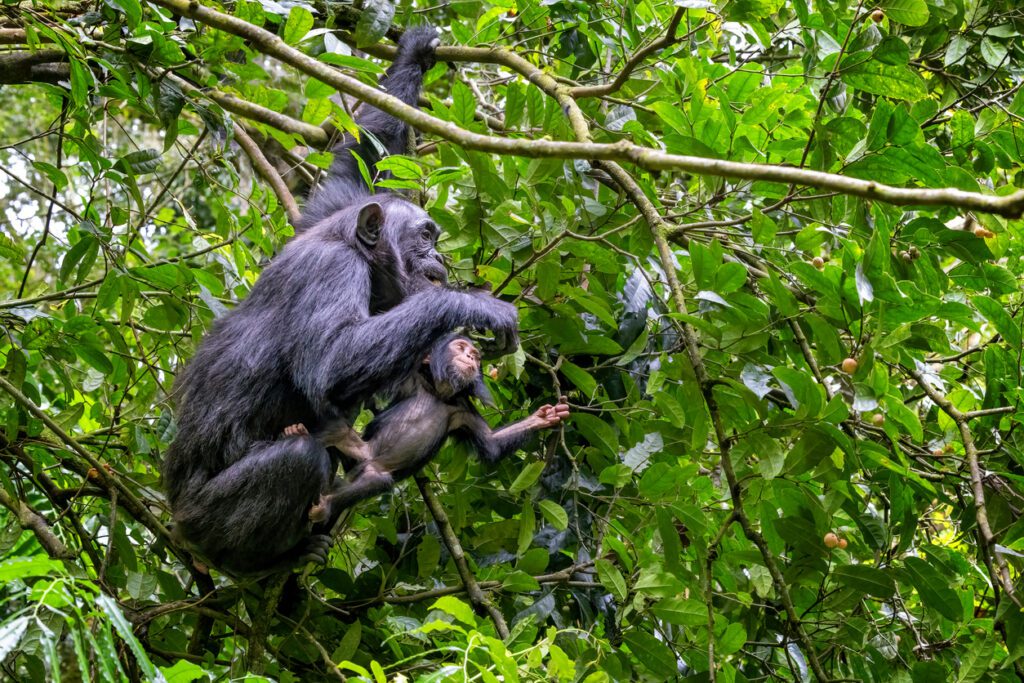
Fruits from colder climates, temperate fruits, have not evolved as food sources for humans. Temperate and acidic fruits have evolved with seed-dispersing animals indigenous to temperate zones, which are mostly birds. However, through directed breeding, we have sped up evolutionary processes to a certain degree.
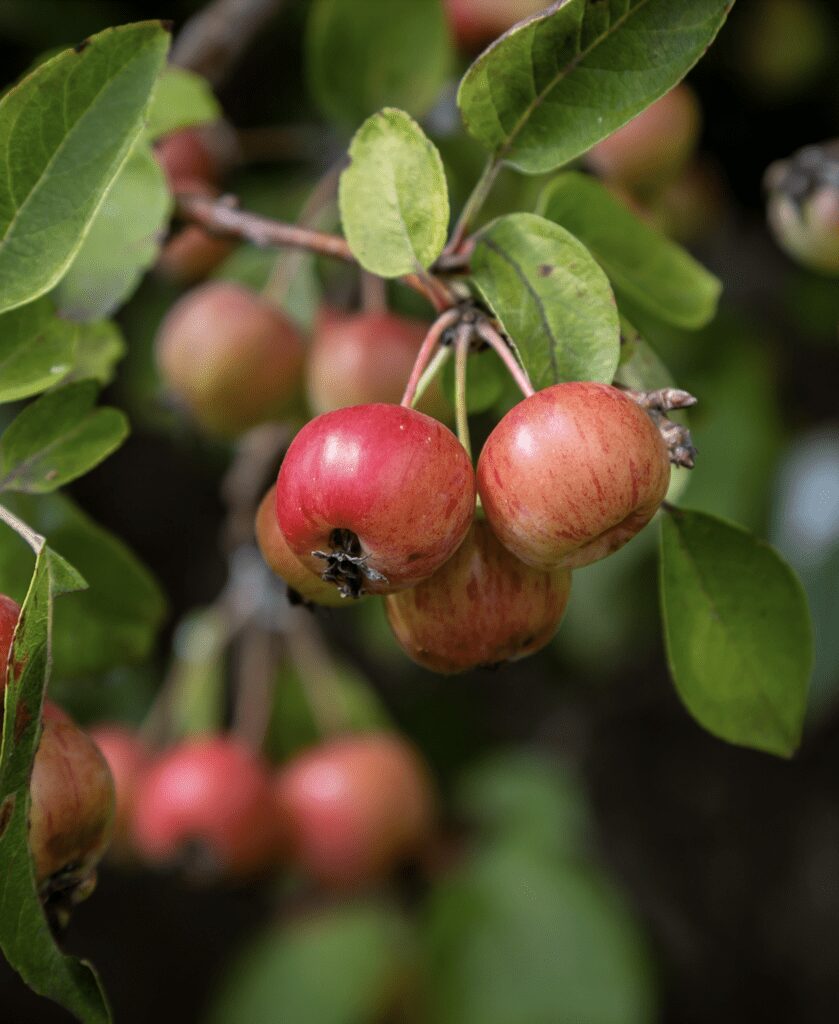
Tropical fruits are essential for health but are severely overlooked
Knowing about the role of tropical fruits in our evolutionary past, it comes as no surprise that tropical fruits are essential for human health:
Fruits from temperate zones cannot substitute tropical fruits as they have another nutritional profile and another evolutionary history. Tropical fruits are generally fleshy and sweet and thus provide energy and nutrient-rich nutrition – the nutrition that we have evolved to get. Temperate fruits are more acidic and watery, and most were not edible before cultivation and selective breeding.
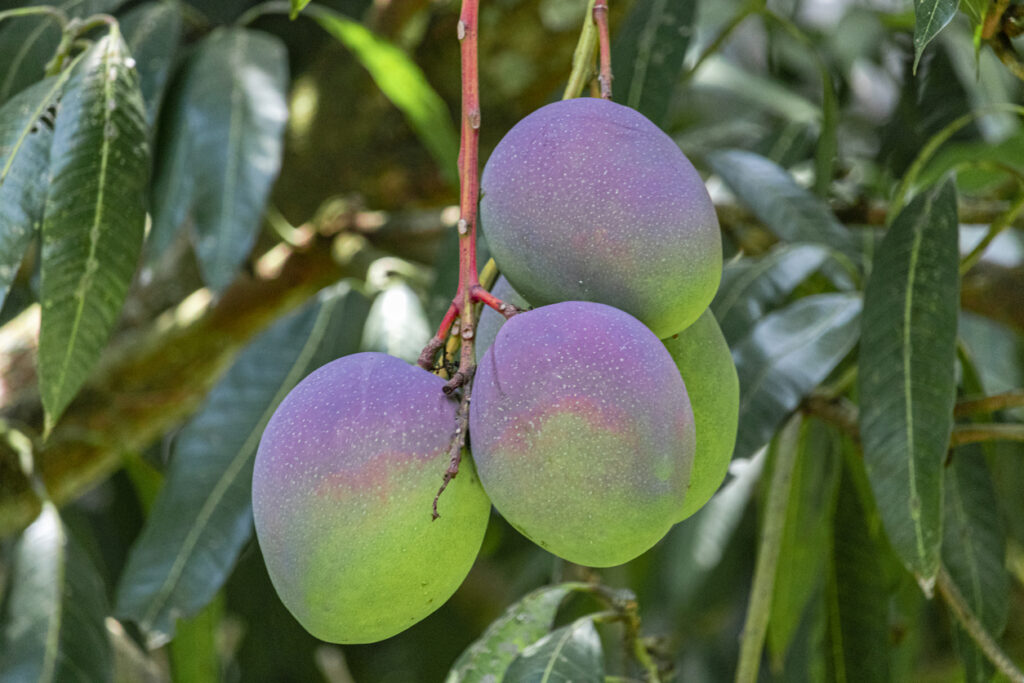
Unfortunately, tropical fruits are rarely emphasized as important staple food in the human diet. Quite to the contrary – newer dietary trends not only fight a war on sugar but even advise against sweet fruits
Nutrition of tropical fruits
Tropical fruits are superior to temperate fruits as a food for humans in more than one aspect: they are bigger, more nutritious, and available all year round – plus primates have co-evolved with tropical fruits as food source.
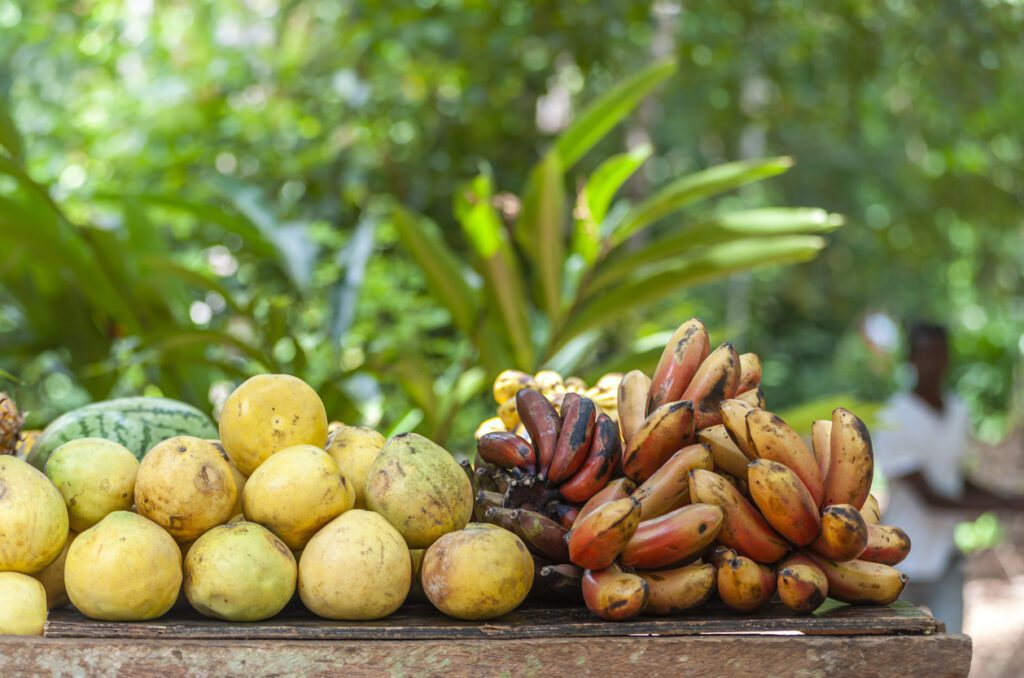
Low in toxicity and anti-nutrients
Most tropical fruits are edible in the wild, and “beyond their macro- and micronutrient contents, the edible and non-edible parts of tropical fruits are an important source of numerous bioactive compounds including carotenoids, sterols and stanols, phenolic compounds such as flavonoids and non-flavonoids phenolics, and the dietary fiber content.” (Sayago-Ayerdi et al., 2021).
High in energy and amino acids
Tropical fruits naturally contain more energetic macronutrients – like simple sugars, fats, and amino acids – than temperate fruits. Tropical fruits contain up to 3.5 g of protein per 100 g, while temperate fruits usually contain much less (read more here). The nutritional “inferiority” is because temperate fruits were bred from being small and acidic fruits into bigger and sweeter fruits than their wild type – in order to be more suitable for human consumption. Most tropical fruits, on the other hand, have evolved naturally with primates and have remained more similar to the original, natural genotype (read more here).
High in micronutrients
In general, tropical fruits and other foods contain a wide range of macro- and micronutrients that the body needs to function and regenerate effectively, including lesser-known (but not less important) nutrients like silica, boron, sulfur (i.e., durian fruit), chromium, manganese (i.e., açaí berry), iron, selenium and more:
“Many fruits and unconventional foods are available in the tropics and represent valuable minerals sources. Green leaves appear as outstanding mineral sources, especially in calcium and iron, followed by nuts. “
Leterme et al. (2006)
As an example serves this detailed analysis of the nutrient composition of mangoes: “mango may provide enough amount of essential minerals for human health, such as calcium, iron, magnesium, phosphorus, potassium, sodium, zinc, copper, manganese, and selenium.” (Maldonado-Celis et al. 2019). Bananas are a good source of potassium and magnesium. Most tropical fruits have high quantities of vitamin C, especially acidic ones, which can boost the immune system and improve recovery after exercise. Orange-colored fruits, like mangoes and papaya, contain beta-carotene (precursor of vitamin A), which gives those fruits their color.
List of tropical fruits
- Açai
- Acerola
- Avocado
- Bananas
- Breadfruit
- Mangosteen
- Custard Apple
- Guava
- Durian
- Tropical Figs
- Rambutan
- Lychee
- Dragonfruit
- Papaya
- Mango
- Passionfruit
- Granadilla
- Soursop
- Starfruit
References
- S. Sayago-Ayerdi, D. L. García-Martínez, A. C. Ramírez-Castillo, H. R. Ramírez-Concepción, M. Viuda-Martos, Tropical fruits and their co-products as bioactive compounds and their health effects: A Review. Foods. 10, 1952 (2021)
- Andresen, E., Arroyo-Rodríguez, V. and Ramos-Robles, M. (2018a) ‘Primate seed dispersal: Old and new challenges’, International Journal of Primatology, 39(3), pp. 443–465. doi:10.1007/s10764-018-0024-z.
- S. Sayago-Ayerdi, D. L. García-Martínez, A. C. Ramírez-Castillo, H. R. Ramírez-Concepción, M. Viuda-Martos, Tropical fruits and their co-products as bioactive compounds and their health effects: A Review. Foods. 10, 1952 (2021)
- Cannon, R.J. and Ho, C.-T. (2018) “Volatile sulfur compounds in tropical fruits,” Journal of Food and Drug Analysis, 26(2), pp. 445–468. Available at: https://doi.org/10.1016/j.jfda.2018.01.014.
- Leterme, P. et al. (2006) “Mineral content of tropical fruits and unconventional foods of the Andes and the Rain Forest of Colombia,” Food Chemistry, 95(4), pp. 644–652. Available at: https://doi.org/10.1016/j.foodchem.2005.02.003.
- Maldonado-Celis, M.E. et al. (2019a) ‘Chemical composition of Mango (Mangifera indica L.) fruit: Nutritional and phytochemical compounds’, Frontiers in Plant Science, 10. doi:10.3389/fpls.2019.01073.



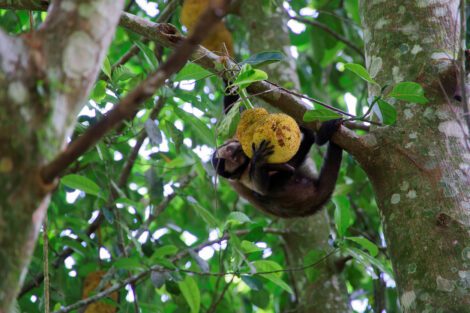
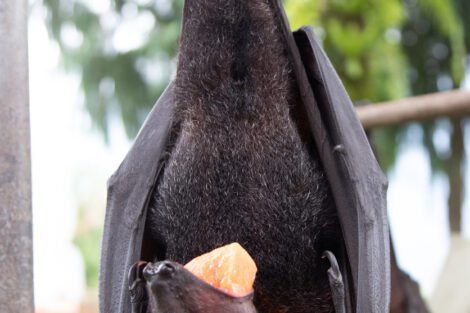
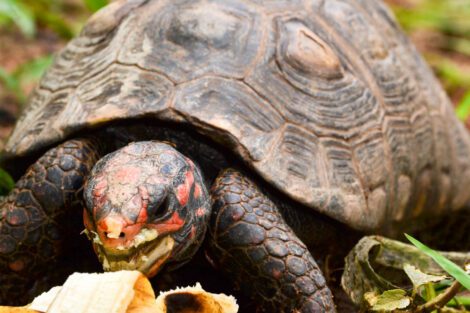
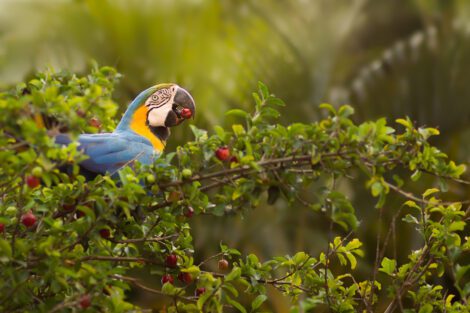
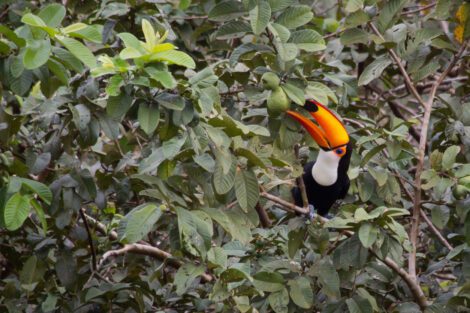
Add Comment